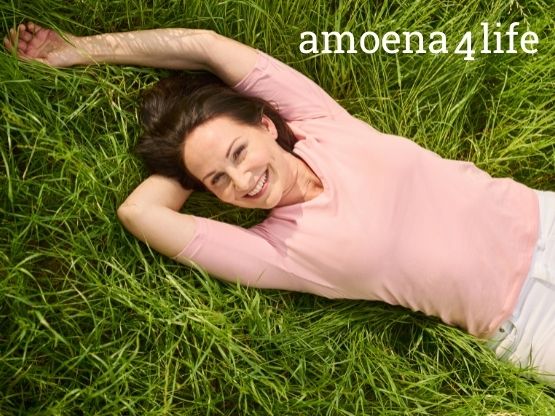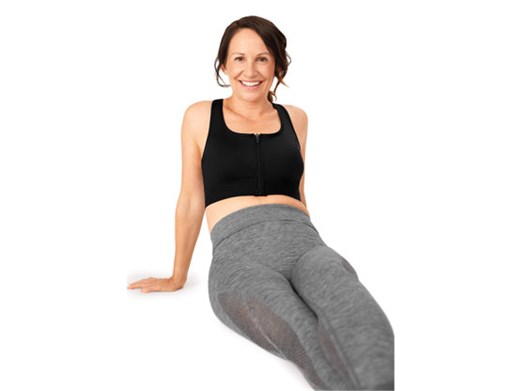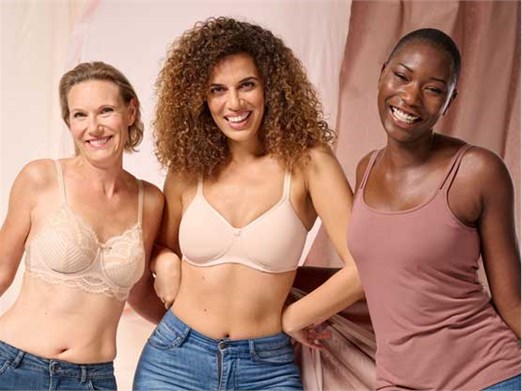Luan's story
Women's health advocate, Luan Lawrenson-Woods shares what it means to advocate for your health

Luan
Lawrenson-Woods is an award-winning patient advocate, podcast host, mentor
& speaker who is all about empowering women to advocate for themselves
& their health. After her own breast cancer diagnosis, she saw first-hand
how overwhelming navigating the healthcare system can be & how difficult it
can be to advocate for yourself.
In this Real Story, Luan shares more about what it means to advocate for your health & not be overwhelmed in the decision-making process.
I am originally from the UK. I came here to study & was fortunate to become
an Australian citizen. I've lived in Sydney for 12 years; I absolutely love it.
This is the first Australian city I came to & it's forever in my heart. I feel
fortunate that I was living here when I was diagnosed with breast cancer in
2017. Australia has great success rates with treatment. We have high rates of
diagnosis, but we have great treatment for breast cancer.
Heidi: Talk about right place right time
Luan: The timing, my diagnosis, where I lived. I lived down the road from a
hospital. I used to get
the bus to chemotherapy & then totter back if I felt well enough.
Heidi: Have you got a definition for what you're doing?
Luan: I am a self-health advocate, working to empower women to advocate for
their health after a cancer or chronic illness diagnosis.
I'm
creating content with a podcast called Regarding Me to give women tips, tools,
strategies & confidence to advocate for themselves so they can get
healthcare that aligns with what's important to them. Or ‘self-health advocacy’ so that you
can advocate for what's right for you.
Heidi: You've touched on making informed decisions, what sparked this passion
for you?
Luan: When I was diagnosed with breast cancer, I was told that because of the
type of cancer that I had & the extent of it, I would need a mastectomy &
needed to consider my reconstruction options. I didn't know anyone who'd had that diagnosis or needed a
reconstruction, I had to explore what reconstruction options were available. My
breast surgeon, she was an oncoplastic surgeon who specialised in implants. But
there is another option which is autologous reconstruction where tissue is
taken from other parts of the body to reconstruct the breast. I was fortunate
that, she connected me to a reconstructive plastic surgeon so that I could be
fully informed about all the options that were available & make a choice.

Heidi: it's amazing what our bodies are capable of.
Luan: It blew my mind when I heard about this autologous tissue reconstruction
- doing this kind of “upcycling” of my body. I had a DIEP flap reconstruction
where part of my tummy was taken to reconstruct the breast. I started to share my
reconstruction recovery on Instagram under the hashtag #100daysdiep
I started to hear from others who were surprised that there was this autologous
reconstruction option. What I learnt from them was that they hadn't been given
all their options. Either breast reconstruction hadn't been offered, or they
might have been guided towards implant-based reconstruction, because the
surgeon that they were talking to specialised in that & the other options
weren't all open to them.
I became passionate about this because I was hearing about decision regret or
people not being told of the long-term effects of their surgery.
It started me on that path to explore what informed, shared decision-making is.
Heidi: Your oncoplastic surgeon was quite helpful. Were you always getting the
information that you needed or was that something you had to work at?
Luan: I worked at it. On reflection there were some things that were said to
me, like ‘you don't want to go flat because then you'll have a prosthesis, &
it'll keep falling out of your swimmers.’
I decided that aesthetic flat closure wasn’t right for me. But there’s a bias
in the way that information was delivered to me.
Otherwise I was given all the options & told where to get them. When I went
to see my plastic surgeon, I realised there was an information gap in Australia
because they’d said, ‘if you want to know more about autologous tissue
reconstruction, you need to look to America for that information because
Australia is lacking in it’. Sadly, it still is lacking in accessible
information about reconstruction options. I had to work at understanding
autologous tissue reconstruction & overcoming that bias of being told ‘you
don't want to go flat.’ Rather than accepting what was said, I explored flat
closure. I did a pros &
cons list for that, just as I did for implants & for the DIEP flap
reconstruction.
Heidi: What would your advice be to someone looking into options for
reconstruction to make sure they're not getting overwhelmed with the decision-making
process?
Luan: Firstly breathe.
I've talked
to a lot of surgeons through Rewritten Me, which is a podcast about
reconstruction after mastectomy. Surgeons say in most instances it's rare that
you need to decide on your reconstruction in that first appointment. It might happen quickly, but for
most people it doesn't.
Try &
take one decision at a time.
It is
overwhelming. There's a lot of information out there & sometimes you need
to take it one day, one question, one breath at a time.
Reflect on what's important to you as part of your informed decision-making, as
part of the self-advocacy. The definition of self-advocacy that I work with is to
know you, know your rights & know what's important to you, what your values
are, what your priorities are & what your boundaries are.
Do some self-reflection, know what it is that you're looking for, that can help
you sift through the decisions & information.
It can become overwhelming, all the information in your head. One of the pieces
of advice you sometimes hear is clearing your mind: dump all that information &
writing it all down. That helped me.

Heidi: Was there any advice you were given when it came time to deciding what
was right for you?
Luan: I was diagnosed with cancer in one breast & had a unilateral single
mastectomy. There was lots of talk in relation to the subtype of cancer that I
had, where people had decided to have their healthy breast removed & to
have a bilateral mastectomy & reconstruction. I had my mastectomy with a
tissue expander and radiotherapy; my reconstruction was the year after. During
that time, it was suggested to have the natural healthy breast removed. I
started to consider that because a DIEP flap construction can only be done
once.
I started
to think that because DIEP is a one-shot kind of surgery, should I have both
breasts removed & reconstructed?
A great
piece of advice that I had from my plastic surgeon was don't make that the only
reason to have your healthy breast removed, we can find other ways & there
are other parts of the body that it can be reconstructed from if you need a
mastectomy later.
I don't
carry any genetic variant or mutation. I don't have family history that would
increase my risk, so the evidence was that removing the healthy breast didn't
reduce my risk of recurrence. A doctor said you're going to be so closely
monitored that if there is an issue, it should be picked up early. That was one
of the greatest pieces of advice.
Heidi: How do you know or test if a decision that you're making is right for
you?
Luan: It might be seen as a bit of an “airy fairy” answer because I feel it,
kind of in my body, that something's right for me.
I will also do work to arrive at a decision. I’ll do a pros & cons list. I'm
a mind mapper.
What do I know now? What other questions do I have? It comes down to; how would
I feel if things were to change in a week or a year, would I be confident with
the decision that I've made now. I can only make the decisions that are right
for me with the information that I have now.
It's a gut
feeling, part of that is not trying to make that decision right there & then.
That for me
is a key thing, to not try & make a snap decision.
Heidi: If you could send message to yourself before you were diagnosed, what would
you say?
Luan: I would say “you've got you.”
I always
thought I was a glass half empty person until I got diagnosed. That if
something like that happens to me, I'll be on the floor, just distraught. And I
was, but I got back up. I'm not sure I really believed in myself, being able to
get back up, but I for sure know that I can now.
You are stronger than you than you think you are, & more courageous than
you could ever imagine.
Advocate,
advocate, don't be scared to speak up.
It's hard in these knowledge imbalances that we have, with our health
professionals. But ask all the questions.
As told to Heidi Flaherty, March 2025
For more about Luan check out
Her website







